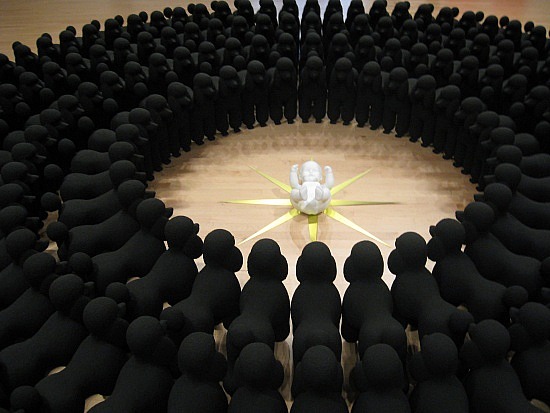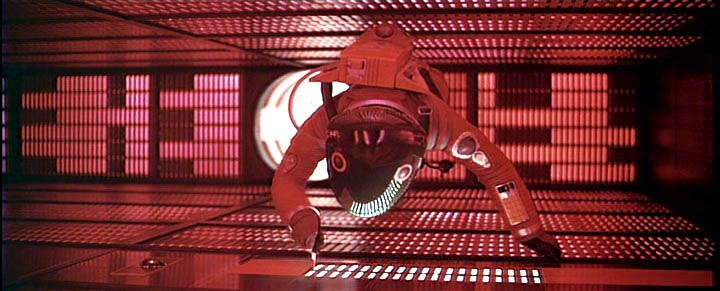The xerox machine: printing press of the people
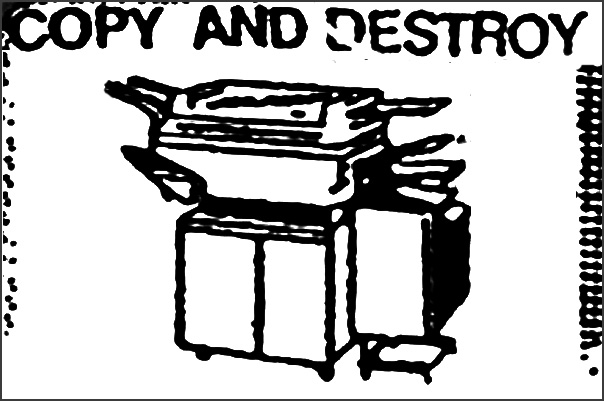
Karen Lillis is currently serializing a memoir about working at St. Mark’s Bookshop called Bagging The Beats At Midnight: Confessions of an Indie Bookstore Clerk over at Undie Press. Her recent installment, titled “People Who Led Me to Self-Publishing,” discusses the inspiring and energetic figures she encountered, people who took artistic matters into their own hands by making sloppy, lo-fi xeroxed booklets that were sold on a special consignment rack at St. Mark’s. Karen reminds us that writers such as Anais Nin, William Blake, Walt Whitman, Kathy Acker, Gertrude Stein, and others all self-published at one point. There’s a certain magic about it—the immediacy of it, the openness, the way any wing nut or fanatic or obsessive outsider can be given an equal hearing on the consignment rack. No filtration or editorial process—just print, copy, distribute.
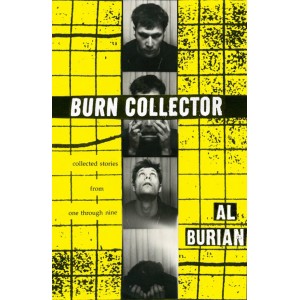 In a recent email I sent to Al Burian, I wrote that I was interested in bridging the gap between the small press/indie publishing world and the self-publishing/zine world. Al is kind of a cult figure in the self-publishing world, but is probably virtually unknown to small press and indie lit readers (although he did get some kind of honorable mention in The Best American Nonrequired Reading series one year). I’ve been reading his zines since I was 13 and I’m still totally obsessed with them. Since Al Burian was my favorite zine writer, over the years I let everyone I knew borrow his writings—teachers, friends, family. Some instantly became obsessive fans of his work as well. Since last month Al’s out-of-print collection of early zines, titled Burn Collector, is finally back in print after being republished by PM Press. (You should check it out—I’ve probably read it more times than any other book in my life.) Al’s zine Burn Collector and others like his inspired me to start self-publishing when I was 15.
In a recent email I sent to Al Burian, I wrote that I was interested in bridging the gap between the small press/indie publishing world and the self-publishing/zine world. Al is kind of a cult figure in the self-publishing world, but is probably virtually unknown to small press and indie lit readers (although he did get some kind of honorable mention in The Best American Nonrequired Reading series one year). I’ve been reading his zines since I was 13 and I’m still totally obsessed with them. Since Al Burian was my favorite zine writer, over the years I let everyone I knew borrow his writings—teachers, friends, family. Some instantly became obsessive fans of his work as well. Since last month Al’s out-of-print collection of early zines, titled Burn Collector, is finally back in print after being republished by PM Press. (You should check it out—I’ve probably read it more times than any other book in my life.) Al’s zine Burn Collector and others like his inspired me to start self-publishing when I was 15.
e-books all calorie suck
E-book assassin, etc. My first response was falling sky, or I am sick of people saying the e-book will garrote the book book. But then I read the article and found several points for possible discussion here:
1. Was the indie bookstore having troubles anyway? The e-book might be gaseous, but maybe the canary died from starvation?
2. One complaint is about “browsing.” You’ll do your browsing online, then just drop by the brick/mortar store and get the book you already know you want. You won’t browse at the store. To me, if you enter the store, all is good. Who cares why/how you entered?

3. But people sell their books online now, so don’t enter a used store to sell, and therefore another opportunity missed to buy.
4. Google ebooks allows indie bookstores to join/not beat the future.
5. All the ebooks in the world aren’t going to replace the “space” of a bookstore, readings, signings, coffee, conversation….
Psychic Master Style Manual

1. I am appalled by this A&E show called Psychic Kids: Children of the Paranormal. The show’s shtick is that the grown ups–a psychic and a therapist it looks like–help psychic children “use their powers for good,” i.e. shoving scared little girls into dark rooms and expecting them to keep their wits about them. God, scary kids make for good tv. You know that’s what the show’s creators said sitting around that well-lit Hollywood brainstorming table.
2. I’m interested in this book: The Master Switch by Tim Wu. Here’s what Very Short List has to say about it:
In his new book, The Master Switch: The Rise and Fall of Information Empires, Columbia Law School professor Tim Wu argues that our increasing dependence on a single network (the internet) makes us more and more vulnerable to private interests bent on controlling the flow of information.
Much of the book is taken up with deep-focus histories of radio, telephone, film and television: Wu coins a Gladwellian phrase—”the Cycle”—to describe the trend toward media consolidation in each industry, and wonders how far away we really are from an internet that’s totally under corporate control. “Every other invention of its kind has had its period of openness, only to become the basis of yet another information empire,” he writes. “Is the internet really different?”
Stasis, Movement, Perception, Forward

from the manifesto of transition, a literary journal, published in 1929: “Tired of the spectacle of short stories, novels, poems and plays still under the hegemony of the banal word, monotonous syntax, static psychology, descriptive naturalism, and desirous of crystallizing a viewpoint… Narrative is not mere anecdote, but the projection of a metamorphosis of reality.”
from Reddit: “In 1903 the Wright brothers flew for 59 seconds. 38 years later the Japanese bombed Pearl Harbor. 28 years after that, we landed on the moon. We went from gliding a few feet off the ground for less than a minute to launching rockets out of orbit, traveling for hundreds of thousands of miles, landing on the moon, and then returning, all within a single lifetime.”
–
If you define technological growth/advancement as the continual manifestation of processes previously unexperienced, how would you define cultural growth/advancement? Is there such a thing? I sometimes think that evolution is a weird and harmful idea; so easy to term something as growth that may be more destructive in implicit or temporally stretched ways. Most of this relates to what I get in arguments about most of the time, anyway, which is: should there ever be an accepted utopia-pointed all-human goal? And if not, doesn’t the notion of advancement, even on a small (cultural; decade-to-decade) scale crumble? And, even smaller still: isn’t the (for now mostly inexplicable) emotional foundation for human action the purest and most reasonable foundation there is?
addendum: Also: if we say that technological improvement is understood as making new processes or making old processes with less energy, maybe we try to make our culture more efficient.
What is the best OpenSource word processing program for a Mac? Does your writing utility affect your writing?
Check out the Teleportal Readings videos. They are stunning. The one of Dean Young reading, OMG, I was watching it, loving the amazing book art fly around, and I had that rare feeling of wanting something to last forever and simultaneously wanting it to end so I could find out who mad such a mad masterpiece.
Salvatore Pane on Earthbound
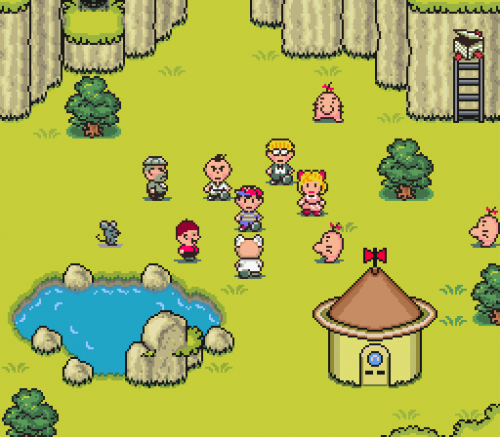
An awesome appreciation of one of my three favorite video games & media experiences. (others: Chrono Trigger & Final Fantasy VI (or III on the version I had))
UT Acquires Denis Johnson’s Archive
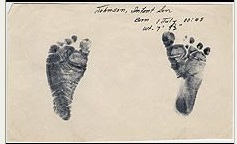 We noted when UT acquired David Foster Wallace’s papers here. And now we’ll note the purchase of Denis Johnson’s archive, which includes floppy disks and baby footprints.
We noted when UT acquired David Foster Wallace’s papers here. And now we’ll note the purchase of Denis Johnson’s archive, which includes floppy disks and baby footprints.
I think I like the idea of archiving authors’ papers, but I wonder how these libraries will acquire their electronic materials? I remember one of my professors saying that UVA had passed on purchasing his email archive. Will such an acquisition be important in the future? How will those of us who are interested in that sidewise material access it? Who will look after it? What do you think about this impulse we have to sift through an author’s unpublished papers, and how will that translate to his or her electronic writing?
So Watson Going To Happen When They Startson Writing The Great American Novel?
Turns out, making time to read the Times was totally worth it, although this article is free online.
Basically, computer scientists have programed a supercomputer named Watson (not yr dad’s supercomputer, a new one – so you can chew on what that means) to interpret English syntax well enough to answer Jeopardy! questions using a shitload of data uploaded from books, magazines, and newspapers (all the stuff we don’t have time to read ((yet))).
While it’s far from perfect, there’s definitely some potential here for the same sort of freakish synapse connections we make when we play with language and such and !

